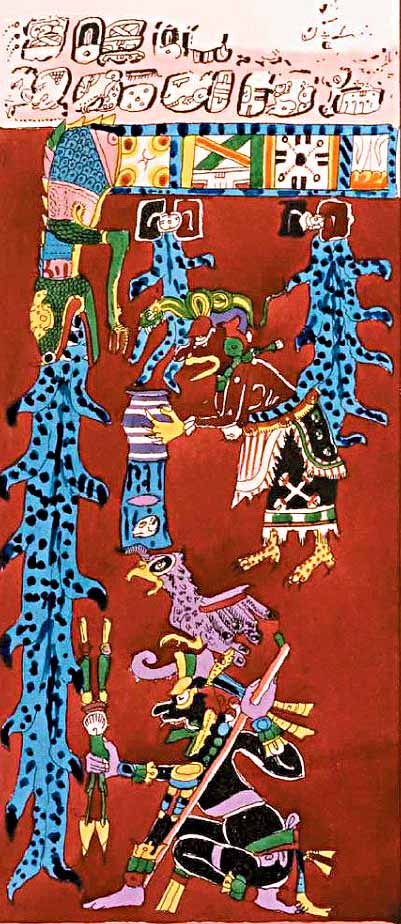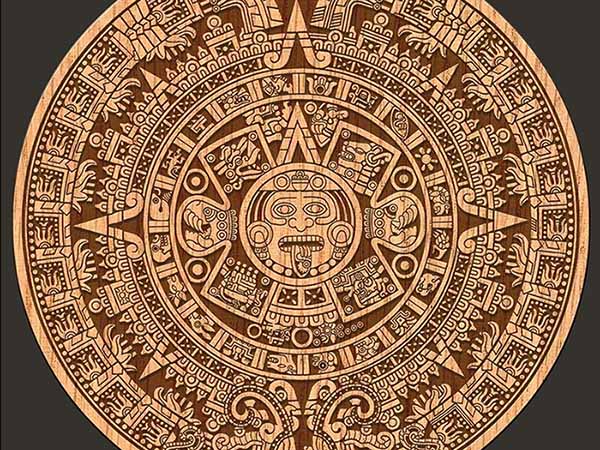The 2012 "Prediction"
People have long been fascinated by the Mayan calendar. And for good reason, I suppose. It's extremely accurate, not requiring the 1 day adjustment (leap year) every 4 years that ours does. Because of this, people assume that the Maya had some kind of mystical power, or foresight (I've even heard of some theories involving extra-terrestrial influence). Because, how could people who lived that long ago be that clever? We've come a long way. They didn't even have computers! Well, 4000 years is absolutely nothing in evolutionary terms. People back then were just as smart as we are.
The Birth of a Ridiculously Complicated Timepiece [1]
The Maya were astronomers. They payed a lot of attention to cosmic events, and planned their own rituals accordingly. Of course, it was only a matter of time before they combined all these events into some sort of time measurement, which would predict events (such as eclipses) without the need to make complicated calculations. They also needed some manner to keep track of time over long periods (because, of course, their mighty culture had existed since the beginning of time, hadn't it?) Thus, their priests (who basically amounted to astrologers) came up with a calendar to chart the sky. They used a base 20 system for some reason (some astrological event no doubt, knowing them). The calendar consisted of several measurements of different lengths (or "cycles"), most of which conformed to the base 20. The cycles are the kin (day), the uinal (month), the tun (year), the katun, the baktun, and the Long Count. There are 20 kins in a month, 18 uinals in a tun, 20 tuns in a katun, 20 katuns in a baktun (almost 400 years if you're attempting to keep count), and 13 baktuns in a Long Count. The baktuns were cycles associated with the levels of the Mayan heaven.
But of course, they needed to start the calendar somewhere. So instead of starting it, quite logically, on the day it was made, they decided to set the start date at some partially random point in the past (it corresponds to August 11, 3114 BCE). I say partially random because the date (August 11) isn't precisely random, being the day of Passover in Mesoamerica at that time. The year, however, is completely 100% arbitrary. In fact, it's about 200 years before the Maya even existed as a culture. It is believed that this was done to show the greatness of the King and his family, saying that they had led the people for all that time or some such egotistical thing. Now, it's completely coincidental that the Long Count which "started" August 11, 3114 BCE ends on December 21, 2012 CE. After that, the next Long Count begins, and the cycle starts anew. So no, the calendar doesn't END on December 21, 2012 CE. Jeeze.
The Catastrophe Myth [1]
But of course that couldn't be the end of it. There would have to be something mystical about the turnover of a Long Count, wouldn't there? Otherwise it would be boring. So, the Maya created the legend that each Long Count was preceded by a great catastrophe. The last one was a big, world-wide flood. How they could possibly know that (assuming it's true, which it isn't) is beyond me. So what happens on December 21? The Maya are strangely silent about that.
 |
| The last page of the Dresden Codex depicts a sky caiman barfing water onto the land |
The Best Pranksters Ever Didn't Even Realize the Great Trick They Pulled On Us
It's a shame really. If they were anything like me, knowing they had just created the means for illiciting mass panic in 3000 years (or so) would have given them a kick.
Remember that the Maya couldn't even foresee their own destruction at the hands of the Conquistadors. They really didn't see that coming, did they? Whoo boy. We don't need some ancient, doomed culture to predict our downfall, anyway. We're doing a fine job of destroying ourselves on our own, thank you very much.
[1]: Much of the specific information fittingly gleaned from a magazine called "The Maya" (from the editors of Archaeology)


No comments:
Post a Comment